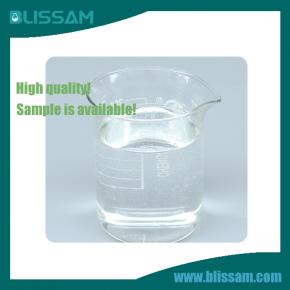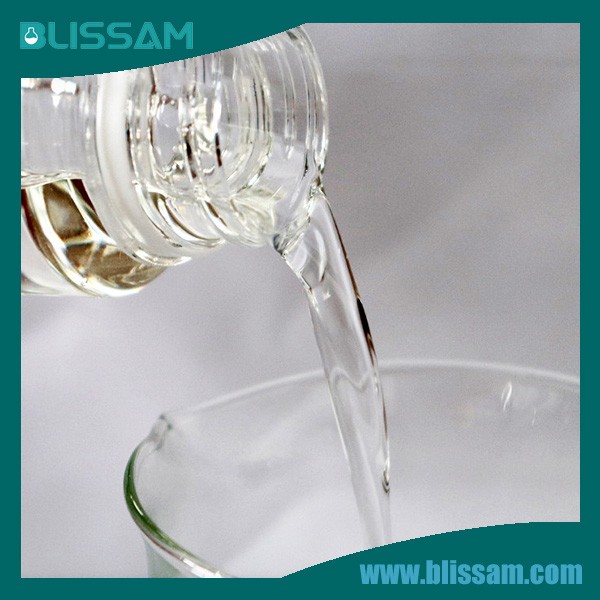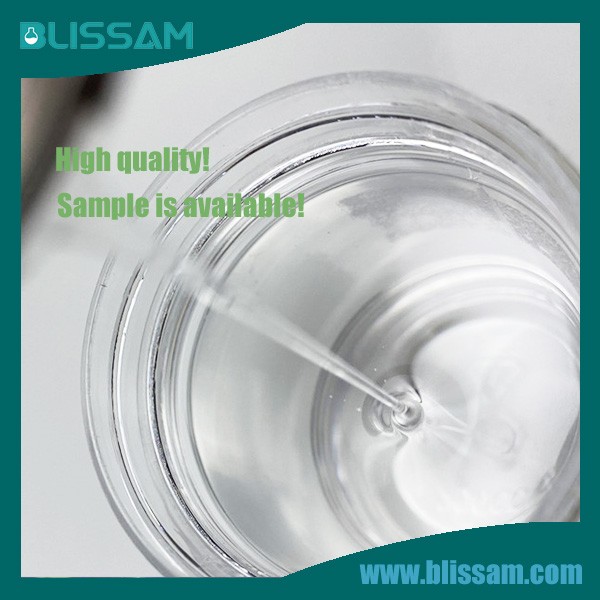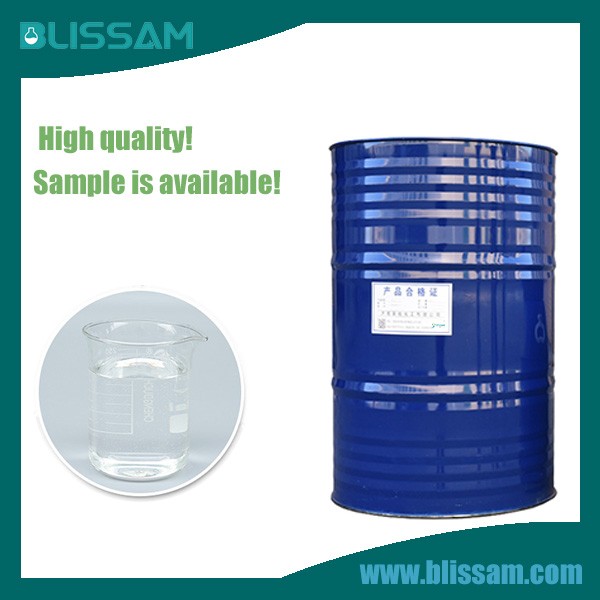Silicone fluids, also known as silicone oils or polydimethylsiloxane, are versatile materials that have become increasingly popular in many industries. These fluids are composed of silicon, oxygen, and carbon atoms, resulting in a highly stable and versatile compound, and offer a wide range of properties that make them suitable for use in diverse applications, from automotive to cosmetic products. In this article, we will explore the use and performance of silicone fluids, including its manufacturing process, quality inspection, raw materials, and safety considerations.

BLISSAM, a leading manufacturer of silicone fluids, recognizes the importance of providing high-quality products to its customers. With decades of experience in the industry, we has established itself as a reliable supplier of silicone fluids, catering to various industries such as pharmaceuticals, cosmetics, automotive, and more.
Methyl Hydrogen Silicone Fluid
Polyether Modified Silicone Fluid
High thermal stability
Silicone fluids have a unique molecular structure that contributes to their exceptional physical and chemical properties. The most notable property is their high thermal stability. They can withstand extreme temperatures ranging from -50°C to 250°C, making them a suitable choice for applications that require high-temperature resistance.
Low surface tension
Another significant property of silicone fluids is their low surface tension. This characteristic allows them to spread easily and provide excellent lubrication and anti-sticking properties, making them ideal for use in high-speed applications such as in automotive engines and gears.
Low viscosity
Additionally, silicone fluids have a low viscosity, unlike other conventional fluids. This feature allows them to flow freely and provide a smooth and effortless movement. This low viscosity also makes it suitable for applications requiring a high-speed flow, such as in hydraulic fluids.
Non-toxic, Non-reactive, non-flammable
It has a non-toxic, non-reactive, and non-flammable nature, making them safe for use in various products. They do not react with other chemicals, making them compatible with a wide range of materials. These properties make silicone fluids highly desirable in a variety of industrial and consumer products.

The versatile properties of silicone fluids make them suitable for a wide range of applications, including in automotive, aerospace, personal care, and medical sectors.
Automotive industry - Silicone fluids are highly used in the automotive industry for their exceptional lubricating properties. They are used in engine oils, transmission fluids, and other lubricants to reduce friction and wear. It can also improve fuel efficiency and engine performance due to their low viscosity and high thermal stability.
Aerospace industry - The aerospace industry also relies on the use of silicone fluids for their high-temperature resistance and low freezing point property. They are used in hydraulic systems, as well as in heat transfer fluids for satellites and spacecraft, where extreme temperatures are expected.
Personal care products - Silicone fluids are widely used in personal care products due to their smooth and silky feel. They are commonly found in skin and hair care products such as serums, shampoos, and lotions. They act as emollients, providing a soft and velvety texture to these products.
Medical applications - Silicone fluids are safe for use in medical applications due to their non-toxic and non-reactive nature. They are used in various medical devices, such as catheters, bandages, and prosthetics. Their low surface tension makes them ideal for use in surgical instruments and as lubricants for syringes and needles.

The use of silicone fluids offers numerous benefits, making them a preferred choice in different industries. Some of these benefits include:
● Thermal stability - As mentioned earlier, silicone fluids can withstand extreme temperatures, making them ideal for use in high-temperature applications. They do not degrade or lose their effectiveness under high heat, making them a reliable lubricant for machinery and equipment operating in harsh conditions.
● Excellent lubrication - The low surface tension property of silicone fluids provides superior lubrication, reducing friction and wear between moving parts. This feature extends the lifespan of the machinery, reducing maintenance and replacement costs.
● Chemical inertness - They have a non-reactive nature, which means they do not interact with other chemicals or substances. This characteristic makes them ideal for use in sensitive applications, such as in the medical and food industries, where purity is crucial.
● Versatility - It can be modified and tailored to meet specific requirements, making them suitable for a wide range of applications. They are available in various forms, including fluids, gels, pastes, and solid rubbers, each with unique properties for specific purposes.

The performance of silicone fluids is affected by various factors, including temperature, pressure, and shear rate. Higher temperatures may cause the fluid's viscosity to decrease, reducing its lubricating abilities. Similarly, high pressure and shear rates can also cause the fluid's viscosity to drop and decrease lubrication. Hence, it is essential to select the right type of silicone fluid for the intended application to ensure optimal performance.
Moreover, compatibility with other materials must be considered, as some materials may react with or dissolve silicone fluids, affecting their performance. It is crucial to conduct compatibility tests before using silicone fluids in contact with other substances.
Manufacturing process:
Silicone fluids are manufactured through a polycondensation reaction of a siloxane monomer. This reaction produces a silicone polymer, which is then processed to obtain the final product with the desired properties. The manufacturing process varies depending on the type of silicone fluid required, whether it is low viscosity, medium viscosity, or high viscosity.
The manufacturing process is a highly controlled and precise operation. It involves mixing, heating, and cooling processes to achieve the desired molecular weight and viscosity. Quality control measures are also incorporated at every stage of the manufacturing process to ensure consistency and accuracy of the final product.
Quality inspection:
Quality inspection is a crucial aspect of silicone fluid manufacturing. BLISSAM conducts extensive quality checks and tests on its silicone fluids at every step of the production process to ensure that the final product meets the required specifications and standards. This process includes both in-process and final product inspections to identify any potential defects and ensure that the product is compliant with industry standards.
The quality inspection process also includes laboratory tests to determine the physical and chemical properties of the silicone fluids. These tests include viscosity measurement, density measurement, pH value determination, and more. Through strict quality control measures, we are able to deliver high-quality silicone fluids that meet the diverse needs of its customers.
Raw materials:
The raw materials used in the production play a significant role in determining the final product's properties. Silicone fluids are mainly derived from silicone polymers, which are synthesized from siloxane monomers. These monomers can be obtained from various sources, including silicon, oxygen, carbon, and hydrogen. The type and quality of these raw materials directly affect the final product's performance and thus, must be carefully selected by manufacturers.
BLISSAM sources its raw materials from reputable suppliers and conducts strict quality checks to ensure the purity and quality of these materials. This enables them to produce high-quality silicone fluids with consistent quality and performance.
Safety Considerations:
When handling silicone fluids, safety should always be a primary concern. Like any other chemical material, it can pose safety risks if not handled properly. Manufacturers adhere to strict safety guidelines and regulations to ensure the safe handling of silicone fluids during the manufacturing process.

In addition, BLISSAM provides safety data sheets and product information to its clients to facilitate proper handling and use of its silicone fluids. It is important to note that they are not toxic or hazardous, but precaution and proper handling procedures should always be followed to avoid any accidents or potential harm.
Silicone fluids are versatile materials with a wide range of applications and properties. Its use in various industries has continued to grow, thanks to companies like BLISSAM, which consistently deliver high-quality products through their rigorous manufacturing processes, quality inspection, and use of the best raw materials. It is crucial for manufacturers and users to understand the importance of safety when handling silicone fluids to prevent any potential harm.
Contact:
Phone: +86-15957191858
E-mail: info@blissam.com
Whatsapp:+8615957191858
Add: A647, No. 9, Xiyuan Road, Xihu District, Hangzhou, Zhejiang, China
We chat
